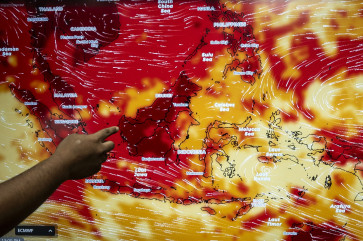Jokowi works with Oz to overcome testy ties
Time for reflection: Australia's Prime Minister Scott Morrison (left) walks with President Joko “Jokowi” Widodo as they leave the House of Representatives at Parliament House in Canberra on Monday
Change Size

T
ime for reflection: Australia's Prime Minister Scott Morrison (left) walks with President Joko “Jokowi” Widodo as they leave the House of Representatives at Parliament House in Canberra on Monday. (AFP/Tracey Nearmy)
President Joko “Jokowi” Widodo on Monday became just the second Indonesian leader to give a speech to a joint session of the Australian Parliament, almost a decade after his immediate predecessor gave a rousing speech about the neighbors’ great future together in the same forum.
Like his predecessor Susilo Bambang Yudhoyono, Jokowi emphasized the common values that both countries hold dear and played down the differences that have often defined their turbulent journey of shared history.
Also like Yudhoyono, he inherited a relationship that has had its share of ups and downs: from conflicts over the treatment of asylum seekers and drug convicts to disagreements about the sacred status of Jerusalem.
But as confidence grows following the ratification of a landmark trade deal in Indonesia’s House of Representatives last week and the subsequent signing of a 100-day plan of action to implement it, it is Jokowi’s vision of a stronger economic relationship that resounded heavily in the chambers of the Australian parliament.
Jokowi proposed four priority issues for Indonesia and Australia to work on together before they commemorate a century of diplomatic ties in 2050 — by which Jokowi predicted the two countries would become big players in both the Indo-Pacific region and the world.
“First, [we must end] intolerance, stop xenophobia, stop radicalism and stop terrorism,” Jokowi told the audience of lawmakers in Indonesian — unlike his predecessor — according to a live stream from the Australian House of Representatives.
He also called for the partners to collaborate over the development of the Pacific region and work together to preserve the environment and for sustainable development — and even dropped yet another cutesy Avengers reference in his speech.
Most prominently, Jokowi spoke about the need for Indonesia and Australia — which celebrate 70 years of diplomatic relations this year — to strengthen their economic cooperation in the next few decades, including with the newly concluded Indonesia-Australia Comprehensive Economic Partnership Agreement (IA-CEPA).
“Collaboration is the keyword here; collaboration creates opportunities, develops new centers of economic growth and finds solutions to all the global economic challenges,” he said.
“If we can do this, the Indo-Pacific region will be the future center of global economic growth. Indonesia and Australia must become the anchor of collaboration in the Indo-Pacific.”
The Indo-Pacific is a region straddling the Pacific and Indian oceans, in which Australia's own security and economic interests collide. Indonesia has offered a viable solution to Canberra's problem in the ASEAN Outlook on the Indo-Pacific, experts say.
Jokowi’s Australian counterpart, Prime Minister Scott Morrison, went on to say: “For Australia, we see Indonesia's success as something to be celebrated. We count Indonesia as among our most important partners.”
But not everyone was immediately swayed by the positive overtures.
Foreign Policy Community of Indonesia founder Dino Patti Djalal said the challenge now was how to ensure the economic agreement would boost trade and investment activities, considering the slow pace of similar initiatives Indonesia had led, such as the ASEAN Economic Community.
“The real work starts now,” said the former diplomat, who was among the few people in Yudhoyono’s circle to fall victim to Australia’s wiretapping activities that sent the relationship into a nosedive after they were exposed in 2013.
Dino said that in the few past years, relations with Australia focused more on the political, diplomatic and strategic aspects, where Jakarta and Canberra were already more aligned. “But without economic cooperation the relations were handicapped,” he told The Jakarta Post on Monday.
Separately, University of Indonesia international relations expert Evi Fitriani said that Indonesian-Australian relations in recent years had been much warmer compared to in the previous decade, owing mainly to the conclusion of the IA-CEPA, the formulation of which started in 2010.
“[The relationship reached its] lowest level during the 2013 spying scandal and the 2011 live cattle ban, which was brought about because [Australia thought] it was hurting its own industry,” Evi said.
In 2013, it was revealed that Australian intelligence had attempted to illicitly monitor the mobile phone calls of Yudhoyono, his wife and other senior officials, prompting a strong reaction from Indonesia, which recalled its ambassador from Australia to review all areas of cooperation with the southern neighbor.
Under Jokowi, relations cooled again after the President ordered the execution of Australian members of the infamous Bali Nine drug ring and further plummeted after Indonesia suspended defense cooperation when former military commander Gatot Nurmantyo accused Canberra of belittling the national ideology.
Ahead of Jokowi's visit, Indonesia's backsliding on human rights was thrust back into the spotlight, with groups such as Amnesty International and Human Rights Watch urging Australia to put Jokowi on the spot.
For his part, Jokowi made sure Australia was reminded of its own history, closing his speech with a quote by indigenous Australian musician Jimmy Little: “We are all gifted with the opportunity to succeed, but you get further if you extend the hand of friendship.” (tjs)









